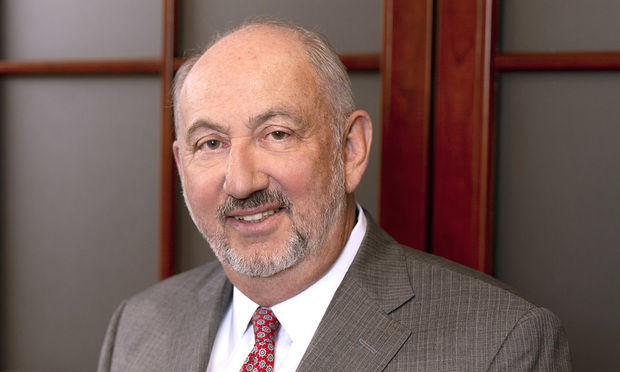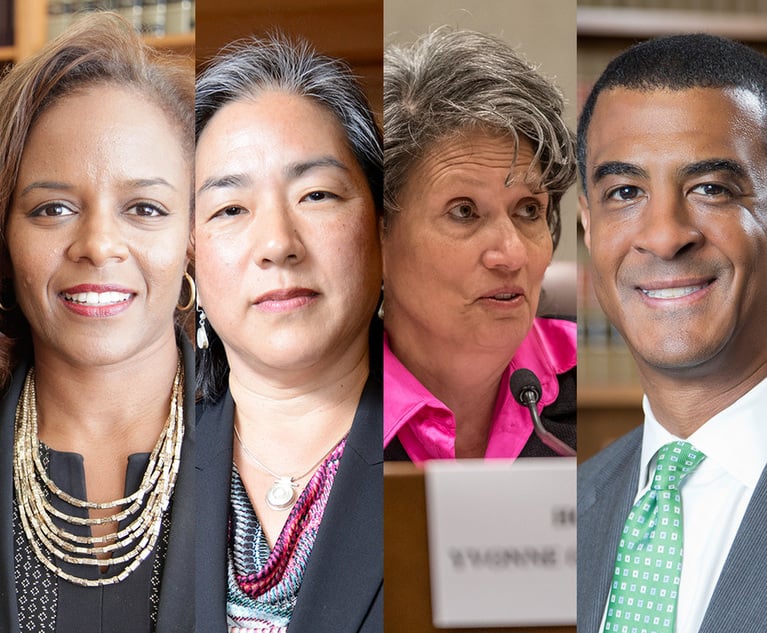Litigator of the Week: A Shocking Win for Terwilliger in Ex-Congressman's Corruption Case
In convincing the feds to drop all criminal charges against former Rep. Aaron Schock, McGuireWoods partner George Terwilliger III scored a win that the Washington Post described as a “stunning."
March 08, 2019 at 11:12 AM
8 minute read
 George Terwilliger at McGuireWoods on November 27, 2018 in Washington, D.C.
George Terwilliger at McGuireWoods on November 27, 2018 in Washington, D.C.
Our Litigator of the Week is McGuireWoods partner George Terwilliger III for a win that the Washington Post described as a “stunning reversal for the government” and the Chicago Tribune called “virtually unheard of in a high-profile corruption case.”
Terwilliger represented Aaron Schock, a former Republican congressman from Illinois who was indicted in 2016 on 24 felony counts including wire fraud, mail fraud, theft of government funds and filing false tax returns. (You might recall him as the congressman who lavishly decorated his office a la “Downton Abbey.”)
On Wednesday, federal prosecutors in Chicago offered a deferred prosecution agreement. If Schock pays his back taxes—about $40,000, according to CNN—and reimburses his campaign $68,000, the feds will drop all criminal charges.
How the heck did that happen? Terwilliger discussed the case with Lit Daily.
Lit Daily: Who is your client and what was at stake?
George Terwilliger: Our client is former U.S. Rep. Aaron Schock, whose liberty was at stake. In addition, unfounded charges rob a person of their reputation. As former Labor Secretary in the Reagan Administration Ray Donovan famously said after winning a hard fought battle against criminal charges: “What office do I go to to get my reputation back?”
When and how did you come to be involved in the case?
Another member of Congress referred Aaron to me in March 2015. Aaron called me to talk about the situation, we met over the next couple of days and he decided McGuireWoods was the best firm to represent him.
How broad were the government's original allegations? What sorts of conduct were they zeroing in on?
One of the most fundamental challenges in the case was that the government's criminal investigation was not focused at all. It was an unjustifiable investigation of a person in search of a crime.
The allegations included challenging reimbursements by the House of Representatives for official expenses based on prosecutors' interpretations of ambiguous House rules that are the exclusive authority under the Constitution for what is, in fact, reimbursable and charging as a false statement an expenditure report to the FEC that categorized a vehicle purchase as a “transportation expense.”
Mr. Schock's agreement with the government to resolve the case explicitly acknowledges that as a result of not keeping adequate documentation of miles driven subject to reimbursement, for example, that resulted in him being reimbursed for more miles than were actually driven.
What were the overarching themes of your defense?
The dominant theme is that there is a difference between mistakes and crimes. Juries across the country are instructed every day on criminal intent and told that things that occur because of mistakes, inadvertence or accident are not criminal. Objective review of the relevant conduct in this case put it in that category.
Who were the members of your team and how did you work together?
Christina Egan, Bob Bittman and Ben Hatch, all former prosecutors, were the government investigations & white collar litigation partners on the team with me. Associates Nate Pittman and Rebecca Gantt also did truly outstanding work, especially on appellate matters in the 7th Circuit and the U.S. Supreme Court.
The team had to analyze thousands of transactions and millions of pages of records in order that we master the relevant facts in a wide-ranging investigation. Then we had to take that information and build a complete understanding of a factual narrative and legal analysis of the matters claimed to be possible violations of law. Finally, we had to delve deeply into what and how the government investigated the case to ferret out facts supporting legal challenges to various aspects of the case.
In your motion to dismiss for prosecutorial misconduct filed on August 1, 2017, you accused the government of asking “inappropriate and highly invasive questions about Mr. Schock's sexual orientation and relationships.” Did you have any hesitation about making this argument–which was then widely reported by the press?
We considered carefully including that in our filings. We included them because it was relevant to an objective assessment of the government's conduct in the grand jury investigation. That line of questioning was one part of a wide array of questioned conduct on the part of the government.
From the beginning, this was a high-profile case with intense media interest. What was your strategy for dealing with that?
To be simple and straightforward with the media, fashioning our message with the facts and relevant law. On the last day, we said exactly what we said on the first day: yes, mistakes on financial matters were made, but those mistakes were not crimes.
We also realized from the start that we needed top professional media help, and we found it right in our own house. Mark Hubbard, a senior vice president with the firm's public affairs subsidiary, McGuireWoods Consulting, provided excellent help working with Aaron and the legal team to shape the coverage.
Your client said of assistant U.S. Attorney Timothy Bass, who originally led the prosecution, “I do feel like I've been wronged in this process by a prosecutor who saw me as his ticket to stardom and who was allowed to go unchecked for many years.” What's your take on this?
My take is that the facts of the conduct of one prosecutor in particular speak for themselves. I leave it to others to make judgments about that.
Last summer, the presiding federal judge, Colin Bruce in Springfield, was removed from hearing all criminal cases for alleged improper contact with the prosecutor's office in another case. Schock's case was re-assigned to Judge Matthew Kennelly in Chicago. Not long after, the prosecution team was also replaced. What impact did this have? Was it a turning point?
It was definitely a turning point because the prosecutors in Chicago told Judge Kennelly that they were going to take a fresh look at the case. Over the course of several months they did just that. They should be commended for doing a thorough review and for having the courage to use their own best judgment as to what was an appropriate resolution.
The Washington Post called the government's decision to dismiss all charges a “stunning reversal.” What were some of the keys to your ability to resolve the case on such favorable terms?
We knew what the facts of the case were and we knew that under the law the allegations in the indictment were either very weak or non-existent.
Most importantly, the evidence did not support establishing criminal intent. Staying focused on that as well as attacking the result on the government's unforced errors on constitutional issues added up to demonstrating a case with little merit and a lot of problems for the government.
What do you hope will be the legacy of this case?
I truly hope that the government will look closely at how this case proceeded from investigation forward and recognize the need for better supervision of the prosecution function and, where needed, a process for meaningful reviews of field cases at DOJ headquarters.
Using weak cases to bring splashy indictments is a formula for undermining the credibility of law enforcement. I have said repeatedly that the vast majority of federal prosecutors do important work to the highest standards of conduct and I admire them for doing so. But where there is a deviation from those standards and the public sees untoward conduct, it diminishes respect for both the prosecution function and the rule of law.
This content has been archived. It is available through our partners, LexisNexis® and Bloomberg Law.
To view this content, please continue to their sites.
Not a Lexis Subscriber?
Subscribe Now
Not a Bloomberg Law Subscriber?
Subscribe Now
NOT FOR REPRINT
© 2025 ALM Global, LLC, All Rights Reserved. Request academic re-use from www.copyright.com. All other uses, submit a request to [email protected]. For more information visit Asset & Logo Licensing.
You Might Like
View All
‘Listen, Listen, Listen’: Some Practice Tips From Judges in the Oakland Federal Courthouse

Litigators of the Week: A Knockout Blow to Latest FCC Net Neutrality Rules After ‘Loper Bright’

An ‘Indiana Jones Moment’: Mayer Brown’s John Nadolenco and Kelly Kramer on the 10-Year Legal Saga of the Bahia Emerald

Litigators of the Week: A Win for Homeless Veterans On the VA's West LA Campus
Trending Stories
- 1How Alzheimer’s and Other Cognitive Diseases Affect Guardianship, POAs and Estate Planning
- 2How Lower Courts Are Interpreting Justices' Decision in 'Muldrow v. City of St. Louis'
- 3Phantom Income/Retained Earnings and the Potential for Inflated Support
- 4Should a Financially Dependent Child Who Rejects One Parent Still Be Emancipated?
- 5Advising Clients on Special Needs Trusts
Who Got The Work
J. Brugh Lower of Gibbons has entered an appearance for industrial equipment supplier Devco Corporation in a pending trademark infringement lawsuit. The suit, accusing the defendant of selling knock-off Graco products, was filed Dec. 18 in New Jersey District Court by Rivkin Radler on behalf of Graco Inc. and Graco Minnesota. The case, assigned to U.S. District Judge Zahid N. Quraishi, is 3:24-cv-11294, Graco Inc. et al v. Devco Corporation.
Who Got The Work
Rebecca Maller-Stein and Kent A. Yalowitz of Arnold & Porter Kaye Scholer have entered their appearances for Hanaco Venture Capital and its executives, Lior Prosor and David Frankel, in a pending securities lawsuit. The action, filed on Dec. 24 in New York Southern District Court by Zell, Aron & Co. on behalf of Goldeneye Advisors, accuses the defendants of negligently and fraudulently managing the plaintiff's $1 million investment. The case, assigned to U.S. District Judge Vernon S. Broderick, is 1:24-cv-09918, Goldeneye Advisors, LLC v. Hanaco Venture Capital, Ltd. et al.
Who Got The Work
Attorneys from A&O Shearman has stepped in as defense counsel for Toronto-Dominion Bank and other defendants in a pending securities class action. The suit, filed Dec. 11 in New York Southern District Court by Bleichmar Fonti & Auld, accuses the defendants of concealing the bank's 'pervasive' deficiencies in regards to its compliance with the Bank Secrecy Act and the quality of its anti-money laundering controls. The case, assigned to U.S. District Judge Arun Subramanian, is 1:24-cv-09445, Gonzalez v. The Toronto-Dominion Bank et al.
Who Got The Work
Crown Castle International, a Pennsylvania company providing shared communications infrastructure, has turned to Luke D. Wolf of Gordon Rees Scully Mansukhani to fend off a pending breach-of-contract lawsuit. The court action, filed Nov. 25 in Michigan Eastern District Court by Hooper Hathaway PC on behalf of The Town Residences LLC, accuses Crown Castle of failing to transfer approximately $30,000 in utility payments from T-Mobile in breach of a roof-top lease and assignment agreement. The case, assigned to U.S. District Judge Susan K. Declercq, is 2:24-cv-13131, The Town Residences LLC v. T-Mobile US, Inc. et al.
Who Got The Work
Wilfred P. Coronato and Daniel M. Schwartz of McCarter & English have stepped in as defense counsel to Electrolux Home Products Inc. in a pending product liability lawsuit. The court action, filed Nov. 26 in New York Eastern District Court by Poulos Lopiccolo PC and Nagel Rice LLP on behalf of David Stern, alleges that the defendant's refrigerators’ drawers and shelving repeatedly break and fall apart within months after purchase. The case, assigned to U.S. District Judge Joan M. Azrack, is 2:24-cv-08204, Stern v. Electrolux Home Products, Inc.
Featured Firms
Law Offices of Gary Martin Hays & Associates, P.C.
(470) 294-1674
Law Offices of Mark E. Salomone
(857) 444-6468
Smith & Hassler
(713) 739-1250






